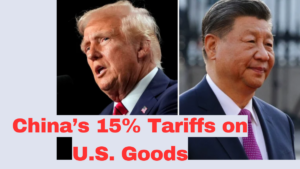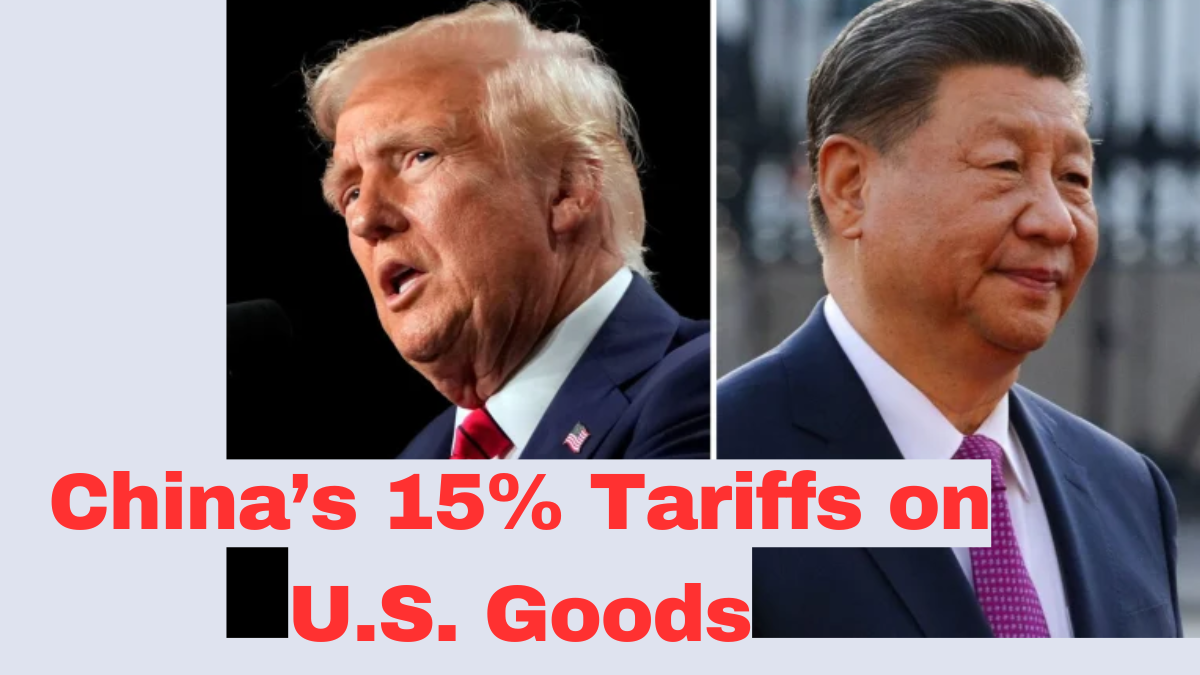In a move likely to escalate trade tensions, China has announced additional tariffs of up to 15% on selected U.S. goods starting March 10. This retaliation is the latest development in the ongoing trade conflict between the two economic giants. The new tariffs cover a range of products, and their impact could reverberate across global supply chains and international trade.
This article delves into the reasons behind China’s decision, the products affected, and the broader implications for both countries’ economies.

Reasons Behind the New Tariffs
The decision to impose additional tariffs on U.S. goods follows ongoing disputes between the U.S. and China over trade imbalances, intellectual property rights, and market access. The two countries have engaged in trade negotiations for years, but finding common ground has proven difficult.
China’s move is seen as a direct response to U.S. tariffs on Chinese products, which were introduced as part of the broader trade war that began in 2018. These tariffs were aimed at addressing issues like unfair trade practices and protecting American businesses from what were perceived as China’s competitive advantages, including state subsidies and intellectual property theft.
China has repeatedly warned that it would take countermeasures if the U.S. continued to impose tariffs on its exports. With the U.S. maintaining its stance, China has followed through with this new round of retaliatory tariffs, adding further complexity to an already strained trade relationship.
Impact of the Additional Tariffs
The newly introduced tariffs are expected to have significant economic ramifications, not just for the U.S. and China but also for the global economy. Below is a breakdown of the key impacts:
-
Increased Costs for U.S. Exporters: U.S. exporters will likely face higher costs to compete in the Chinese market. Products like agricultural goods, machinery, and electronics are among the most affected by the new tariffs.
-
Harm to Chinese Consumers: Although the tariffs are designed to target U.S. goods, some of the products impacted are also used by Chinese consumers. This could lead to higher prices for goods such as electronics and luxury items.
-
Disruption of Global Supply Chains: The escalating trade war could disrupt international supply chains, with companies in both countries facing increased uncertainty and higher costs. This could potentially impact industries ranging from technology to agriculture.
-
Potential Retaliation from the U.S.: The new tariffs could provoke a fresh round of retaliatory actions from the U.S., further deepening the trade conflict and potentially escalating it into a larger global trade issue.
-
Impact on Global Markets: As both the U.S. and China are key players in the global market, changes in their trade policies can affect international markets, influencing everything from stock prices to commodity costs.
Products Affected by the Additional Tariffs
While China has not specified the full list of products that will be impacted by the new tariffs, reports suggest that some of the following items will likely be included:
| Product Category | Examples |
|---|---|
| Agricultural Products | Soybeans, wheat, corn, and livestock products |
| Machinery and Equipment | Industrial machinery, computers, and telecommunications equipment |
| Electronics | Mobile phones, laptops, and other consumer electronics |
| Luxury Goods | Automobiles, jewelry, and watches |
| Chemicals | Pharmaceutical and other chemical products |
These categories highlight the diverse range of goods that will be subject to the new tariffs. Many of these products are not only central to the U.S.-China trade relationship but also play a role in global supply chains.
Potential Long-Term Effects
The ongoing trade tensions between China and the U.S. are already having long-term effects on both countries’ economies, as well as on global trade patterns. The new tariffs are expected to contribute to the following outcomes:
-
Shift in Trade Alliances: With China and the U.S. imposing tariffs on each other, both countries may look to new markets for trade. China, for example, has strengthened its trade ties with countries in Asia, Africa, and Europe.
-
Economic Slowdown: Both nations could experience an economic slowdown as a result of trade restrictions. U.S. farmers, for example, are particularly vulnerable to tariff impacts, as China is a significant market for agricultural exports.
-
Diversification of Manufacturing: Many businesses may seek to diversify their manufacturing operations in response to the increased costs associated with the trade war. Companies could move some of their production to other countries in Asia or even back to the U.S.
-
Rising Consumer Prices: Tariffs often lead to price increases for consumers. Both American and Chinese consumers may face higher costs for everyday goods due to the additional tariffs.
Conclusion
The announcement of new tariffs by China on U.S. goods signals a deepening of the trade conflict between the two countries. While these tariffs may offer China some short-term leverage, the long-term consequences for both nations and the broader global economy remain uncertain. With ongoing tensions and the potential for further retaliatory measures, businesses and consumers around the world will need to brace for continued trade disruptions and price fluctuations.
Frequently Asked Questions
Why is China imposing additional tariffs on U.S. goods?
China is retaliating against the ongoing U.S. tariffs in an effort to balance the trade relationship and address perceived unfair trade practices.
Which products will be impacted by the new tariffs?
The tariffs will affect a range of products, including agricultural goods, machinery, electronics, luxury items, and chemicals.
How will these tariffs affect global markets?
The tariffs could lead to price increases, disruptions in supply chains, and further uncertainty in global markets, especially in industries like technology and agriculture.
Could the U.S. retaliate?
Yes, the U.S. could impose additional tariffs or other trade restrictions in response to China’s actions, further escalating the trade conflict.
What are the long-term implications of the trade war?
The trade war could lead to a shift in global trade alliances, an economic slowdown in both countries, and increased consumer prices worldwide.
Pari is a passionate writer known for captivating stories that blend imagination and reality. Inspired by travel, history, and everyday moments, Pari crafts narratives that resonate deeply with readers.
